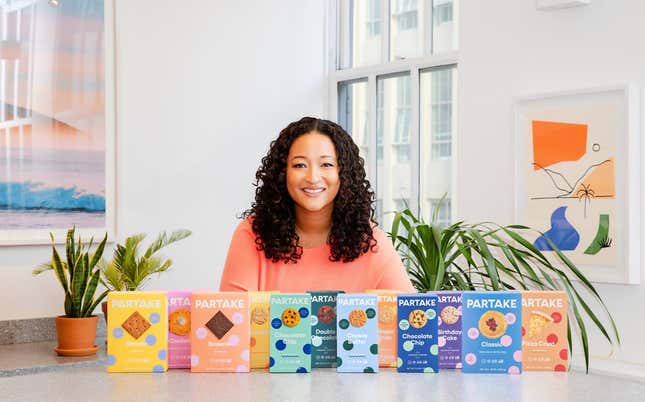
This story is part of our new Start. Build. Grow. series, a celebration of August’s Black Business Month.
According to a report from National Center for Health Statistics, nearly 1 in 17 American children were diagnosed with a food allergy in 2021. And when you take a closer look, the issue impacts Black children more than any other group. Nearly eight percent of Black children 17 years old and younger had a food allergy, compared with 5.3 percent of white children and 5 percent of Hispanic children.
But Partake Foods is on a mission to make things a little easier for people living with food allergies. CEO Denise Woodard founded the company in 2016 which produces gluten-free vegan snacks made without nuts, artificial flavors, preservatives or GMOs.
The Root caught up with Woodard to learn how an idea developed in her kitchen found its way to the shelves of retail giants like Target and Whole Foods.
Woodard, who has a background in packaged goods, planned to spend the rest of her life climbing the corporate ladder. But when she discovered her young daughter had several food allergies, she decided she need to do something about it.
“I was really disappointed with the things I could and couldn’t find for her,” she said.
Frustrated with the stores’ selections, Woodard says her nanny urged her to stop talking about it and be about making good food her little girl could eat.
“I think there were solutions, but none of them met my needs. Because I had no food allergies, I had a pretty high bar. I wanted something that tasted good, had ingredients I could understand and was from a brand that was cool enough that other people without food allergies would eat it. And so while there were things she could eat, I didn’t feel like they met my family’s needs,” she said.
A Kitchen Chemist
Woodard says making delicious snacks without the things her daughter couldn’t eat was easier said than done. Coming up with a product she was proud of involved a lot of trial and error.
“I got into the kitchen with my nanny, and we failed horribly. I realized all of the products out there were full of nutritionally empty flour and a ton of sugar, because it was easy to formulate that way,” she said.
Unsure of her next steps, Woodard turned to LinkedIn to get a little help from her future competition.
“I cold messaged everyone out there who had worked in product development, and thankfully someone responded who was willing to take a shot on me and believed in our mission,” she said.
With a little help and a successful Kickstarter campaign, she developed a line of gluten-free cookies and graham crackers that are available in nearly 12,000 retail locations across the US.
“We finished in the top one percent of food Kickstarters at that time, and we’ve gone from the smallest customer in that facility to the largest one,” she said. “The story worked out really well, thankfully.”
Giving Back
Along with making good food, Woodard says her company is committed to doing good, and is dedicated to solving the problem of food insecurity.
Through a partnership with No Kid Hungry, they donated over a million meals to food insecure families. They also provide snacks for birthday parties for children who experience homelessness through The Birthday Party Project.
“Although some are not able to afford our products, we’re figuring out how to extend our give back efforts to be able to touch as many people as possible,” she said.
Just Do It
When asked for her best advice for aspiring entrepreneurs of color, Woodard says if you have an idea you’re passionate about it, pursue it, even if you have to start small.
“When I was getting my business off the ground, I’d be embarrassed to be at the local trade shows with my $5 tablecloth. But I think it was that scarcity in the beginning that made me a stronger business person. I had to learn how to do every job in the company and make sure I was really listening to our customers so we could make the best decisions, because there wasn’t a lot of room to make mistakes,” she said
“Ideas are a dime a dozen. It’s the execution where the magic happens. It’s about getting out there, doing the work and getting started.”